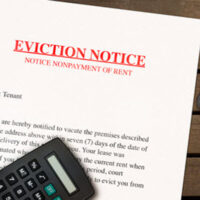Florida’s 7-Day Eviction Notices, and 7 Day Demand to Cures

Florida landlords cannot simply “decide” to evict a tenant. Tenants are guaranteed certain rights under the law. Accordingly, landlords are required to follow specific steps before a tenant is evicted. One important step is serving the tenant with a 7-day eviction notice. This article briefly discusses the different types of 7-day eviction notices, and what tenants can do if they do receive such a notice.
Types of 7-Day Eviction Notices
Florida law recognizes two types of eviction notices that we will be speaking of today.
- 7-Day Notice Without Right to Cure: This type of notice will be issued in circumstances where serious violations have occurred. This might include intentional property damage or repeated disturbances. If this 7-day notice is received, it means that tenants must vacate the property within seven days or an eviction action will be filed. Tenants are not given the right to “cure” or fix, whatever issue prompted the notice of eviction.
- 7-Day Demand to Cure Notice: This type of notice will be issued when the violations have been less severe. This might include rental violations such as having unauthorized guests at the property, unauthorized pets, failing to keep the property sufficiently clean, etc. This type of notice allows tenants seven days to address the problem. If adequately addressed, the tenants should not be evicted.
Content and Delivery of the Notice
A valid 7-day eviction notice should include:
- Landlord and tenant information
- Property address
- Reason for eviction (specific violation)
Landlords must tell tenants the specific reason they are receiving the notice. This is particularly important in instances of the 7-day demand to cure notice. A tenant can hardly be expected to “fix” or “cure” a violation that they are not made aware of.
Florida law allows landlords to serve their tenants these notices via numerous methods, including positing the notice on the property, as well as via certified mail or through personal service.
Responding to a 7-Day Eviction Notice
If you, or someone you love, has received a 7-Day Eviction Notice from their landlord it is important to act quickly. Review the notice carefully and promptly respond. If the claims on the notice are inaccurate – contest them. Not responding because you feel there has been a mistake is not the correct course of action. Silence in the face of these issues can be taken as an admission of guilt/truth to the accusation.
Your options after receiving a 7-day notice will vary depending on what type of notice was given. You can try to negotiate with your landlord, fix the issue within seven days (if you received a demand to cure notice), and/or seek legal assistance from an experienced attorney.
Contact Suncoast Civil Law
Understanding the 7-day eviction notice and 7-day demand to cure can be crucial for Florida tenants and Landlords alike. By knowing your rights and responsibilities, you will ensure that you can take prompt action to protect your interests, and navigate challenging scenarios effectively.
If you are facing a landlord tenant dispute, contact the esteemed Sarasota landlord tenant dispute attorneys at Suncoast Civil Law. Our experienced attorneys can help you understand the legal process and help to protect your rights.
Sources:
leg.state.fl.us/statutes/index.cfm?App_mode=Display_Statute&URL=0000-0099/0083/Sections/0083.56.html
flsenate.gov/Laws/Statutes/2011/0083.53
